Secret weapons of insects
In the natural world, animals almost have their own defense. Live Science page has listed some of the most unique secret weapons of animals
Diving beetles
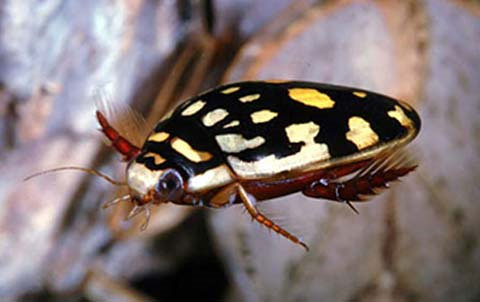
Beetle Thermonectus marmoratus is a diving animal for hunting. They are swimmers and can even eat small fish. Without any prey to bully, the Thermonectus marmoratus can also fly from one area to another. If attacked, these beetles will secrete toxic steroids to fish and amphibians.
Ear deep
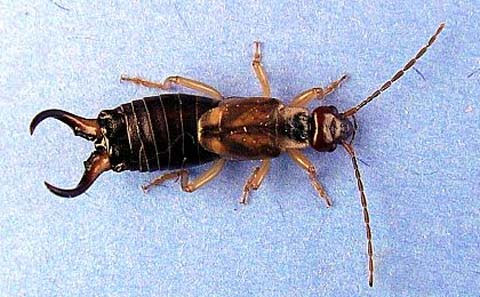
The more of an ear worm looks very scary. However, for other small organisms, the horror lies in the chemicals sprayed from the abdomen of this creature. For convenience, deep ear also directs spraying chemicals towards its double.
Caterpillar
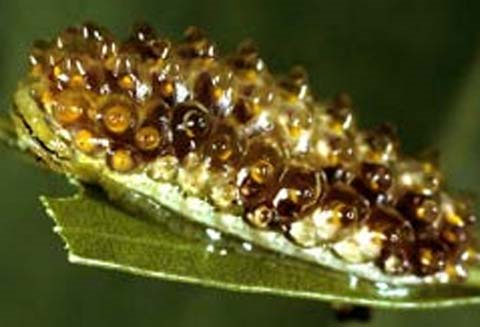
An ant is trying to nibble on this caterpillar named Dalcerides ingenita science. However, the attacker will eventually be "stitched" by the glue coating on the caterpillar's wart.
Bugs with mines
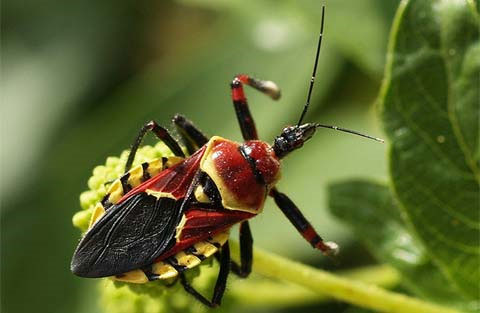
Apiomerus flaviventris has a beak to inject venom in its saliva into its prey. The injection can also cause pain for humans. This creature also secretes a strong odor to defend itself when disturbed.
Vinegaroon
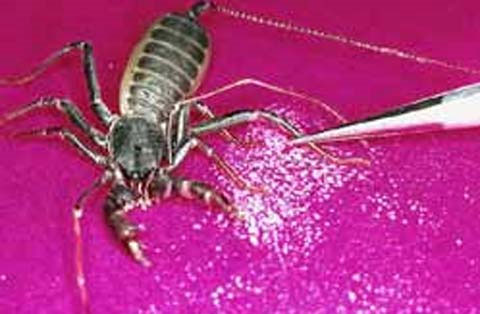
Vinegaroon, the scientific name Mastigoproctus giganteus , has a rather scorpion-like appearance but its rear tail acts as a directional antenna, not used for attack. However, this organism can release a concentrated amount of acetic acid solution (sour vinegar ingredient) through the gland at the end of the tail that can point to any direction with high accuracy. . The secretions will repel ants, mice and other predators.
Scorpion

The amount of venom secreted from the tail of scorpions varies greatly. Although many people fear them, the sting of most scorpions often causes pain like a bee's bite and rarely causes death. Even so, there are still a few deadly scorpion species, including the bark scorpion in southwestern America.
Honeybee

A bee's injection can kill people with allergies. In the United States, more people die from bee stings than those who die from bites or stings of snakes, spiders or any other venomous creature. Only female bees have a nozzle located at the end of the body and the number of these infertile females accounts for a large amount of a beehive's work force. A bee directs its nozzle into the victim and stabs it. The venom will be released when the bee leaves. Losing the hindquarters caused the bee to eventually die.
Florida jungle cockroaches

In the abdomen of cockroach Eurycotis floridana is a gland that produces secretions with 40 ingredients, including acid, ether and stench. Florida jungle cockroaches can spray this nasty excretion as far as 15cm or more. Neither mice nor lizards like this.
Centipede

Owning many feet makes the centipedes look creepy. However, pay attention to the centipede's canines. The front and back of many centipedes look similar. If you confuse the back, the centipede will curl up and bite.Scolopendrid centipedes eat mostly aphids, but their favorite food is toads and mice. This is completely true because they are up to 30.5cm long.
- Secret secret weapon used to assassinate during World War 2
- 11 secret weapons developed by Japan during World War II
- Russia developed a more secret weapon than a nuclear bomb
- Small weapons like insects can destroy humanity
- The United States created a weapon that produced a voice that terrified the enemy
- America's top secret biochemical weapons testing facility
- Impressive figures on American super weapons
- Secret letter reveals the cause of British satellite
- Secret female contraceptive weapons of female dolphins
- Insect-eating insects like to eat
- The Pentagon turns insects into machines
- Mysterious aircraft rumors America deployed space weapons
 Why do potatoes have eyes?
Why do potatoes have eyes? 'Tragedy' the world's largest carnivorous life: Death becomes ... public toilet
'Tragedy' the world's largest carnivorous life: Death becomes ... public toilet Tomatoes were once considered 'poisonous' for 200 years
Tomatoes were once considered 'poisonous' for 200 years Detecting microscopic parasites on human face
Detecting microscopic parasites on human face